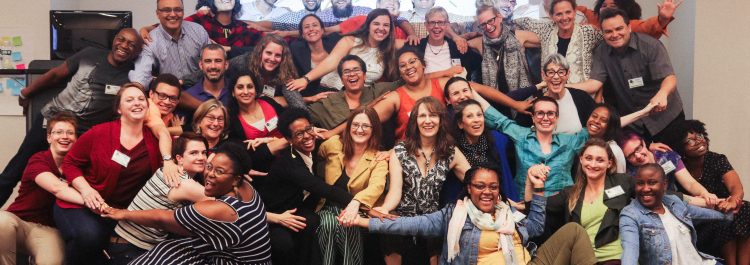This online event produced by the Anglophone colleges in Quebec will take place on January 13-14, 2025. Click here to learn more about this event.
All are welcome! Registration is FREE!
Register for IPDRead more information about the presentations supported and prepared by SALTISE Fellows:
Monday – January 13, 2025 – 12:45-13:30
Block D, Session 11
1) CONFRONTING THE CHALLENGE OF DESIGNING INTERDISCIPLINARY CURRICULA
Presenters:
Selma Hamdani – SALTISE Fellow, Dawson College, Psychology
Phoebe Jackson – SALTISE Senior Fellow, John Abbott College, Physics
Moderators:
Liz Charles – SALTISE co-director, Dawson College
Kevin Lenton – PAREA researcher, Vanier College
Interdisciplinarity is a crucial component of the new Social Science and Science programs (e.g., Thematic Issues in Social Science, paired courses, multidisciplinary courses). However,
designing such integrated content presents challenges due to the compartmentalization of disciplinary skills and knowledge. While interdisciplinarity offers rich opportunities for deeper
learning, few evidence-informed guidelines exist to support the design of integrated disciplinary content (IDC)—particularly with regard to fostering student engagement, promoting critical
thinking across subject boundaries, ensuring interdisciplinary coherence, and aligning the curriculum. This workshop directly addresses these challenges through an interactive and collaborative design process, adapted from a successful “Design-a-thon” previously conducted at Dawson College. Participants will engage in co-designing an interdisciplinary activity alongside colleagues from different disciplines, using selected frameworks of productive learning strategies (see the SALTISE website). Through breakout rooms, participants will collaboratively tackle key design challenges, with a focus on: Jump-starting the process of interdisciplinary course design; identifying solutions to address common constraints, such as aligning learning objectives across disciplines; building networks with colleagues interested in co-design methods. By the end of the workshop, participants will have a practical classroom activity that they can implement in their courses as early as the winter semester.
Monday – January 13, 2025 – 14:45-15:30
Block F, Session 14
2) BEYOND THE HYPE: WHERE CAN AI FIT WITH PRINCIPLED PEDAGOGICAL DESIGNS?
Presenters:
Michael Dugdale – SALTISE co-director, John Abbott College, Physics
Chris Elliott – SALTISE Fellow, Heritage College, Computer Science
The rapid rise of generative AI models is echoing throughout society, and education is no exception. Initially celebrated for their potential to transform both work and learning, these systems are now under increasing scrutiny. Critics have raised significant concerns about biases within AI, the spread of convincingly authoritative misinformation or “hallucinations”, an unresolved issues related to intellectual property, privacy, and the environmental toll of training these data-hungry models. In education, additional challenges — such as threats to academic integrity, overly simplistic or decontextualized responses, and worries about stifling critical thinking skills — further cast doubt on AI’s role in teaching. As the presence of generative AI in education grows, we are left to ask: What principles should guide us in incorporating AI into our pedagogical designs to maximize its potential while mitigating these risks?
Tuesday – January 14, 2025 – 11:00-11:45
Block I, Session 10
3) COURSEFLOW: SUPPORTING CURRICULUM ALIGNMENT AND PEDAGOGICAL DESIGN IN COMPETENCY-BASED INSTRUCTION
Presenters:
Kurt Holfeld – SALTISE Fellow, Dawson College instructor, Interior Design
Susan Martin-Kaller – SALTISE Fellow, Champlain, St. Lambert, Nursing
Moderators:
Liz Charles – SALTISE co-director, Dawson College
Lorraine Chiarelli – SALTISE office
Competency-based instruction emphasizes the alignment of learning outcomes, competencies, and assessments to ensure students acquire the skills and knowledge needed to succeed in
their academic programs. While this approach fosters a learner-centered environment, it can be challenging to balance pedagogical design with the demands of aligning the many curricular
components involved – learning outcomes, competencies, assessments, course and homework hours (ponderation), etc. CourseFlow, a cloud-based platform, offers features that visualize the connections between these instructional elements, providing a clear view of the curriculum flow and supporting overall coherence. This helps streamline the process of maintaining alignment across the curriculum, multiple courses and a single course. This presentation will demonstrate how CourseFlow has been used to improve course design, support curriculum decisions, and foster collaboration among faculty, all while simplifying the management of complex alignment tasks and allowing more time for discussion about how program design decisions can support our students’ learning. Participants will be introduced to the CourseFlow platform and shown how to use it to align courses, content, learning objectives, and competencies. Case study examples will be provided, and time allocated for exploration of the different CourseFlow visualizations.



